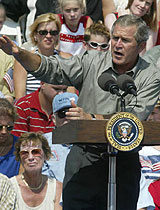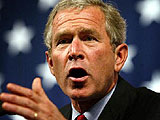FOR a man untroubled by the need for linguistic purity, President Bush surpassed even himself yesterday as he sought to portray President Saddam Hussein as a scheming and evasive dictator.
 | | U.S. President George W. Bush speaks to members of the United Brotherhood of Carpenters and Joiners of America on Neville Island in Pittsburgh on September 2, 2002. |
Declaring that Saddam had "crawfished" out of previous agreements with the United Nations, Mr Bush accused him of "stiffing the world". In doing so, Mr Bush appeared to have invented a word. The verb "to crawfish" is unknown even to slang dictionaries, although it must derive from the crawfish, or crayfish, a reshwater crustacean. According to linguistics experts, such evocative use of the word as a verb has grown in recent years in the US to describe someone who backs out of a position. Asked about the President's use of the word, Ari Fleischer, his spokesman, referred to broken Iraqi commitments to disarm, adding: "This is what Saddam Hussein has tried his best to slither out of, as the President put it, 'to crawfish out of'." Mr Bush went on to say that he would use an address to the United Nations General Assembly next week "to call upon the world to recognise that he is stiffing the world". In this context, the President meant cheating or duping the world. An American who has been short-changed would complain in the vernacular of being "stiffed". But it may be wise for Mr Bush to rethink his choice of words before he addresses the United Nations in New York on September 12. Apart from threatening to plunge the simultaneous translators into meltdown, such language feeds the image overseas of Mr Bush as a hopelessly inarticulate, trigger-happy cowboy, one that Tony Blair was at pains to say this week he regards as a parody. But it is not the first time that Mr Bush has raised eyebrows with his homespun choice of words to articulate pivotal moments in his presidency. In the days after September 11, Mr Bush referred to the 19 hijackers as "those folks". When talking of al-Qaeda, he promised to "smoke 'em out". And in his most famous lapse into folksy rhetoric, he demanded Osama bin Laden "dead or alive".
(Agencies) | 作为一个已经不需要为说一口纯正英语而刻意花工夫的美国人,布什总统似乎总能"语惊四座"。昨天,当他把萨达姆·侯赛因形容成一个诡计多端、奸诈狡猾的独裁者时,又一次产生了这样的效果。 布什总统在指责萨达姆单方面破坏与联合国的协议是"退出协议"的行为时,不但把"龙虾"一词名词动词用作,还将形容词"僵化的"用作动词,称萨达姆"欺骗了全世界。" 看起来这个词应该是总统独家创造的。因为即便是在俚语词典中,也看不到把"龙虾"作动词的用法。但可以肯定的是,这种用法跟那淡水壳类动物多少有点渊源。 据语言学专家介绍,把"龙虾"当成动词用的现象近两年来在美国民间渐渐多了起来,主要是用来形容人们中途撒手退出某项活动。  总统发言人阿里·弗莱舍解释说,布什总统的言下之意是指责伊拉克单方面退出了解除武器的承诺,"萨达姆总想在这件事上开溜,也就是总统先生所说的'龙虾'"。 总统发言人阿里·弗莱舍解释说,布什总统的言下之意是指责伊拉克单方面退出了解除武器的承诺,"萨达姆总想在这件事上开溜,也就是总统先生所说的'龙虾'"。
总统似乎觉得这样的形容还不够生动,他还打算在下周的联合国大会上"号召各国看清萨达姆'僵化全世界'的真面目。" 这里头又有典故了。布什的意思是萨达姆欺骗了全世界。在美国土话中,常把被人愚弄形容成"僵化了。" 看来,总统先生明智的做法是在9月12日联合国大会之前,再斟酌一下他的演讲辞,免得贻笑大方。 这样的措辞不仅可能使现场的同声传译人员彻彻底底的崩溃;还可能替布什总统在全球树立表达低能、好逞口舌之快的牛仔形象。托尼·布莱尔本周就已经对此作了一番评价,称之为"极为拙劣的模仿"。 而这样的"语惊四座"早就不是第一次了。布什总统经常在某些重要场合让听众为他笨拙的措辞大跌眼镜。"9·11"之后不久,他把9位劫机犯称为"那群伙计",还发誓要把本·拉登"从山洞里面熏出来。" 而他最不应该的一次,是在大庭广众之下通缉拉登的时候,还不忘恶狠狠地加上一句,"活要见人,死要见尸!”
(中国日报网站译) |
